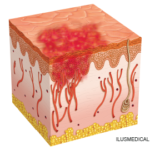
Ms. French
Providing health education materials that are easy to understand is beneficial to both patients and clinicians. “Patients are able to understand their disease and participate more fully in their care, which leads to better health outcomes. Clear communication also helps build trust between patients and their doctors, increasing the opportunity to develop an open and productive relationship,” says Ms. French.
Health Literacy
According to the U.S. Department of Health and Human Services, only 12% of the U.S. population has proficient health literacy, meaning they have the skills to successfully navigate complex healthcare situations without difficulty.1
“Some of those most at risk of having low health literacy include people over 65, members of racial/ethnic minority groups and non-native English speakers. However, it’s impossible to know an individual’s health literacy level by their demographic information or even by whether they appear to understand,” Ms. French says.
The Lupus Foundation of America follows a universal precautions approach to health literacy. “Everyone learns differently, and we provide health education in a variety of formats so that everyone has the opportunity to receive information in the way that suits them best. All of our resources—articles, infographics, videos and podcasts—are created following health literacy best practices,” Ms. French says.
Health literacy needs to be considered when speaking of rare and complex conditions, and cultural differences must be considered when creating educational resources. “The Vasculitis Foundation addressed this need by involving physicians from the region in the production of our video series,” Dr. Sattui says.
Dr. Ursani agrees that acknowledging health literacy is important, “which is why we maintain patient educational content at the sixth grade reading and comprehension level.”
The Future
Aside from the ACR producing patient educational materials in English and Spanish, “there is a push to expand to other commonly spoken languages, and we hope to accomplish this to expand the accessibility of our information in the future,” Dr. Ursani says.
In addition to creating and maintaining high-quality health education materials, the Lupus Foundation of America strives to engage people with lupus, their caregivers and their doctors. Take Charge is a 12-week email series that gives people with lupus information, strategies and resources to help them better understand and manage lupus. “This fall we will be launching a Spanish version, Tome Control, to better serve our Spanish-speaking constituents. We also take the opportunity to focus our outreach efforts through our Spotlight Series, which highlights resources for specific communities to raise awareness,” Ms. French says.


